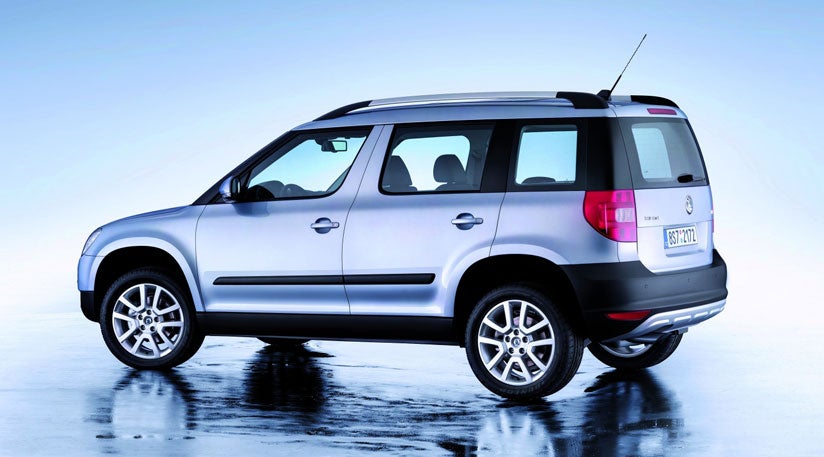Skoda Yeti
There's nothing abominable about Skoda's new SUV. It's rugged without being aggressive and tough, yet sensitive

Here's a comment entered in my notebook during the presentation of Skoda's new Yeti. It suggests it is not abominable at all. "An SUV I really warm towards," I wrote, "friendly, fun – I'm won over."
This newspaper is no fan of the conventional SUV, but I can see the appeal of smaller, gentler, nimbler and greener incarnations. The Yeti is one of those, and sufficiently MPV-like to be considered a "crossover" albeit further towards the mud'n'rocks end of the scale than rivals such as the Nissan Qashqai and the new Peugeot 3008.
What converted me to Yetiphilia, then? The design, for a start. It gives the required impression of ruggedness without looking aggressive or overbearing, thanks to a short nose, a happy face and the bulk-reducing trick of blacked-in pillars for the windscreen and rear corners while the centre pillar, slightly backward-raked, ties roof and body together.
First impressions on climbing aboard are of a quality once unimaginable in a Skoda. It's almost Audi-like in the surface textures and in the fit and finish, and luxurious leather trim is available towards the top (around £22,000) of the price list. There's plenty of room, and the "Varioflex" rear seats can be slided forwards or back, reclined, folded flat, tipped forward in that folded state or removed. Just like you used to able to do in most MPVs, in fact.
You can also remove the middle seat and reposition the outer seats nearer to each other, so creating more shoulder and elbow room. The boot is deep and capacious, with optional bars on each side incorporating sliding hooks to which you can attach load-restraining nets, and there's a clip-on, semi-circular "wall" which can corral smaller items against the right-hand wheel hump.
The engine range shows welcome downsizing, starting at a mere 1.2 litres. A turbocharger gives this little motor a big heart and 105bhp, just as it does in the new Volkswagen Polo, recently praised in these pages. It has a harder job hauling the heavier Yeti but it's lively enough and likely to be frugal.
This could be the optimum Yeti for many. The fact that it has front-wheel drive only probably won't matter to most buyers; the fact that it's the only Yeti available with a seven-speed DSG two-pedal transmission probably will. Otherwise all Yetis have a six-speed manual apart from the lowest-powered (110bhp) 2.0 turbodiesel which gets five gears when matched to front-wheel drive.
Four-wheel drive Yetis can have three different outputs of 2.0 turbodiesel (110, 140 or 170bhp), or the turbocharged 1.8-litre, 160bhp petrol engine that works so well in every Volkswagen group car in which it has so far appeared. The most powerful diesel certainly flings the Yeti along the road with vigour, helped by its considerable torque, but it's perceptibly gruffer than the milder versions of which the 140bhp one is the best compromise. All are quieter than diesels have previously been in Skodas because they now, at last, use common-rail injection.
But the engines aren't what make the Yeti the surprising machine that it is. That feat is performed by the suspension, whose springing and damping characteristics have been calibrated by a magician. The Yeti is supple enough to handle rough tracks or disintegrating British backroads, yet it feels crisp and keen to respond, making it good fun to drive.
And the 4x4 versions are remarkably capable off-road. Press the "off road" button and electronics recalibrate the traction control and the differential lock to suit loose surfaces, and there's a "downhill assistant" which automatically brakes as required to maintain the desired (slow) speed. If you want to go a little faster, just press the accelerator; bizarrely, this works even if you're in neutral and relying on the brakes to keep speed in check. The accelerator simply works as a variable electronic control.
I like the Yeti a lot. It's all the SUV most people could ever need, and a very fine MPV too. In some ways Skoda is the cleverest Volkswagen brand of all.
SUVs: the competition
Kia Soul Burner 1.6 CRDi: £14,995. Looks a bit like a 4x4 but isn't, and has a much smaller engine and lower price. But it looks the part, and does most of the job for most people.
Nissan Qashqai 2.0 dCi All-Mode: from £20,550. This four-wheel-drive version of hatchback-cum-SUV is more than most buyers need but Qashqai is capable and deservedly popular.
Peugeot 3008 2.0 HDI: from approx £20,000. Due here in October. Front-drive only, but clever traction systems maximise off-road ability. No beauty, but good on-road dynamics.
Subscribe to Independent Premium to bookmark this article
Want to bookmark your favourite articles and stories to read or reference later? Start your Independent Premium subscription today.

Join our commenting forum
Join thought-provoking conversations, follow other Independent readers and see their replies